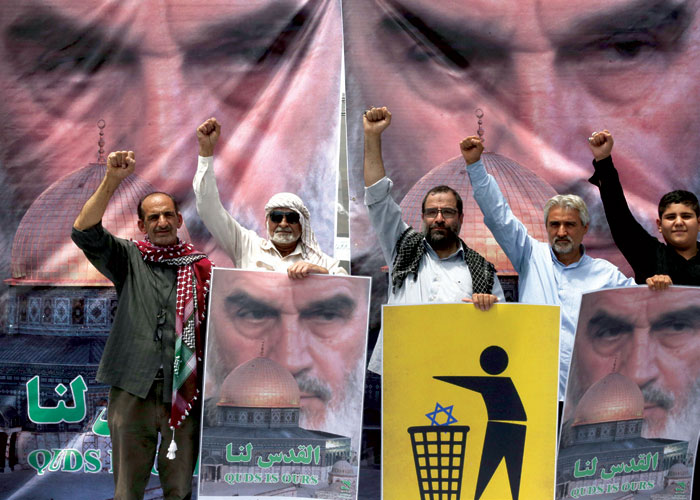How serious is the animosity between Israel and Iran?
Mamoon Alabbasi/The Arab Weekly/December 25/16
Some analysts say Netanyahu’s anti-Iran rhetoric is motivated more by political gains than genuine security fears.
London – The Israeli government confirmed that it was aware that Iran had a 4.5% stake — which could pay Tehran tens of millions of dollars in dividends — in ThyssenKrupp, a German firm that is selling submarines to Tel Aviv.
“We have known Iran was a shareholder in the German company since 2004,” Israeli Defence Minister Avigdor Lieberman said, adding that Israel “had no other alternatives”.
The revelations that the state-owned Iran Foreign Investment Company (IFIC) has shares in a German company that has supplied the Israeli Navy with ships and submarines sparked controversy in Israel.
Critics of Israeli Prime Minister Binyamin Netanyahu accused him of seeking to make personal profit from the deal while undermining Israel’s security and breaking Israeli law, which bans “trading with the enemy”. The German company is represented in Israel by Netanyahu’s personal lawyer.
Israel’s Finance Ministry said that the deal does not break Israeli law as Iranian investment in ThyssenKrupp is too small. Israeli Defence Ministry officials said the German company assured Tel Aviv that Iran did not have access to sensitive information on the submarines.
The episode nevertheless has been embarrassing for Netanyahu, who is a vocal critic of international dealings with Iran, most notably the nuclear deal with the United States and other world powers. Israeli arms dealers previously sold military equipment to Iran but such deals are not publicly state-sanctioned.
Netanyahu has at times been at odds with his own defence establishment, which does not share his view regarding the level of threat Iran poses to Israel. Some analysts say Netanyahu’s anti-Iran rhetoric is motivated more by political gains than genuine security fears, as it would distract attention from the occupied Palestinian territories.
They argue that Iran and its proxies in Syria, Lebanon and Yemen also exaggerate their animosity towards Israel as that would serve their local and regional interests.
“Iran’s rhetoric against Israel is often for local or regional consumption. They use the plight of the Palestinians, who are Sunnis, to hide their sectarian agendas in the Middle East,” said Ghassan Ibrahim, a London-based Syrian analyst.
“Take for example Qassem Soleimani, the commander of Iran’s al-Quds (Jerusalem) Force, who is involved in battles in Syria, Iraq and elsewhere but never set foot in Jerusalem,” he added.
“The same could be applied, to a large extent, to Hezbollah. The militant group now dominates Lebanon in the name of ‘resistance’ against Israel but it is Hezbollah that is making sure that Israel’s borders are not being attacked from anyone in Lebanon.”
Patrick Hilsman, a New York-based journalist who has reported from Syria, said the hostile rhetoric from Iran, Assad and Hezbollah against Israel cannot be taken seriously because all three parties, with the exception of Hezbollah in 2006, have long been avoiding large-scale direct conflict with Israel.
The Syrian regime with the tacit blessing of Iran and Hezbollah has been building stronger relations with Cairo to secure Egyptian support to quash the Syrian rebellion. “If they really cared about Palestinians, they would have pressed Egypt, which enjoys good ties with Israel, to open the Rafah border crossing with Gaza,” said Hilsman.
Mohammed Mohsen Abo El- Nour, an Egyptian researcher who specialises in Iranian affairs, ruled out any military conflict between Iran and Israel. “For purely geopolitical reasons, the two sides (Israel and Iran) do not pose an existential threat towards each other, as they do not share borders,” he said.
Abo El-Nour said the two sides enjoyed strong bilateral relations before the 1979 Islamic revolution but added that even when Iran’s former supreme leader Ruhollah Khomeini took power and sided with the Palestinians, Israel and Iran have never been involved in direct wars against each other.
Iran was at war with Iraq in the 1980s and Israel bombed Iraq early in that decade but neither Tehran nor Tel Aviv were fighting each other, said Abo El-Nour. “Add to that the Iran-Contra scandal,” in the mid-1980s in which Israeli weapons were purchased by Iran to fight Iraq, he said.
Mahan Abedin, an Iranian analyst based in London, said that, although Israel and Iran seek to avoid direct clashes, there is strong enmity between them.
“The Israelis struggle to understand Iran’s anti-Israel ideology because geopolitically the two countries should not be foes but the Iranian leadership is ideologically committed to Israel’s destruction,” said Abedin.
“Otherwise the Iranians wouldn’t have pursued costly regional policies, such as supporting militant Palestinian and Lebanese groups, which also invited the wrath of the United States, resulting in sanctions. If they didn’t believe in it why pay such a high price?”
“Iran needs to be seen to be reaching out to Arab Sunnis,” said Abedin. “That’s why (Supreme Leader Ali) Khamenei met with representatives of the Palestinian group Islamic Jihad in the midst of Aleppo battle.”
**Omair Anas, a research fellow at the Indian Council of World Affairs, said Iranian-Israeli relations may become less hostile after the departure of Khamenei. “Relations may mature once the new supreme leader is elected and if the existing Western-educated executive of (President) Hassan Rohani and (Foreign Minister) Mohammad Javad Zarif remain popular.”
Mamoon Alabbasi is an Arab Weekly contributing editor based in London. You can follow him on Twitter @MamoonAlabbasi






















